46 Top Content Marketing Statistics For 2024 (Latest Data)

Curious about the latest content marketing statistics as you develop your own content marketing strategy for the year?
Content marketing remains to be one of the most effective marketing strategies for businesses of all sizes.
We share statistics on content marketing strategies, blogging, artificial intelligence (AI) in content marketing and more.
Editor’s top picks – content marketing statistics
Here are the top content marketing stats in this article:
- The market size for content marketing will reach $2 trillion globally by 2032. (Allied Market Research)
- Content marketing had the largest return on investment for 14% of marketers in 2023. (HubSpot)
- 79% of companies graded as being “very successful” spend more than 10% of their marketing budgets on content alone. (Semrush)
- 80% of very successful companies have developed a content marketing strategy. (Semrush)
- Video is the highest performing content type according to 45% of marketers. (Semrush)
- Among the latest content marketing trends, 17% of marketers say short-form video performs best in terms of return on investment. (HubSpot)
- 24% of websites graded as high performing publish one article per day. (Semrush)
- 71% of consumers view at least one blog post during the customer journey. (Startup Bonsai)
General content marketing statistics
1. The global content marketing market size will reach $2 trillion by 2032
According to research conducted by Allied Market Research, the market size for content marketing will reach $2 trillion globally by 2032.
The market was valued at $413.2 billion in 2022 and is expected to grow at a compound annual growth rate (CAGR) of 16.9% between now and 2032.
Video platforms will account for the vast majority of the market in 2032 followed by social media platforms and blogs. So, if you’re not focused on visual content, now is the time to start.
The majority of the market’s content marketing strategies will be used for lead generation in 2032, though brand awareness will be a popular use case as well.
Source: Allied Market Research
2. 81.02% of content marketers are optimistic about the future of content marketing
Minuttia surveyed over 600 content marketers, most of whom have content marketing-specific titles like “head of content,” “content lead,” “content manager” and “content strategist.”
Of the 685 marketers they surveyed, 555, or 81.02%, are optimistic or very optimistic about the future of content marketing.
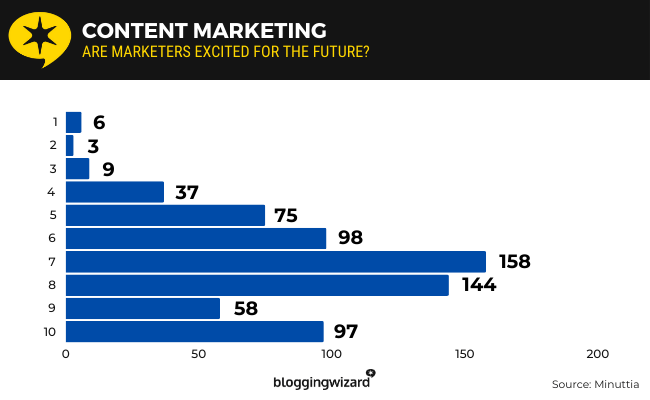
Source: Minuttia
3. 14% of marketers say content marketing had the largest return on investment in 2023
In HubSpot’s latest report on the state of marketing, they asked marketers about the marketing channels that had the greatest return on investment (ROI) for them in 2023.
While websites/blogs and social media received 16% of the votes each, 14% said content marketing had the highest ROI.
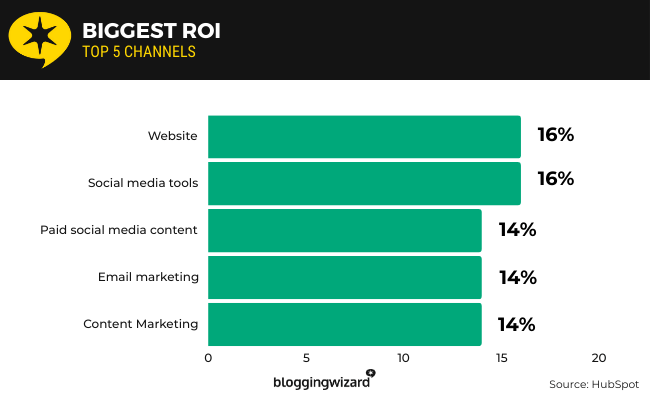
Source: HubSpot
4. 71% of companies use social media to create targeted content
According to Digiday and Foundry360’s latest report on marketing, the majority of companies use social media to carry consumer-facing content.
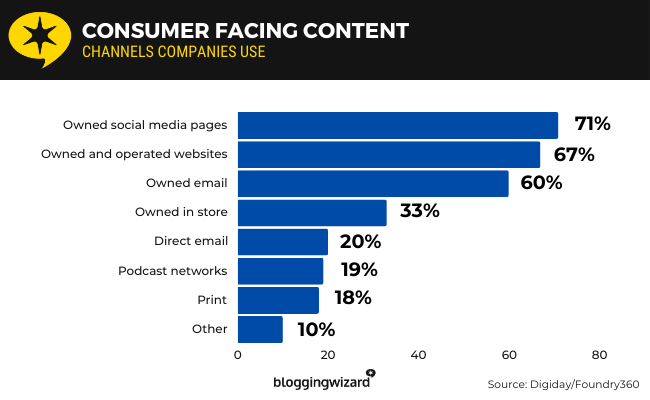
Here are other content marketing channels companies use:
- Own website – 67%
- Email list – 60%
- In store – 33%
- Direct mail – 20%
- Podcast – 19%
- Print – 18%
- Other – 10%
The report states that “other” refers to SMS, retail media and embedded content.
Source: Digiday/Foundry360
5. 33% of companies will create more entertaining consumer-facing content in 2024
In Digiday and Foundry360’s report, they asked marketers about the top goals their companies have in regards to creating consumer-facing content.
The majority, or 33%, voted for “entertainment.”
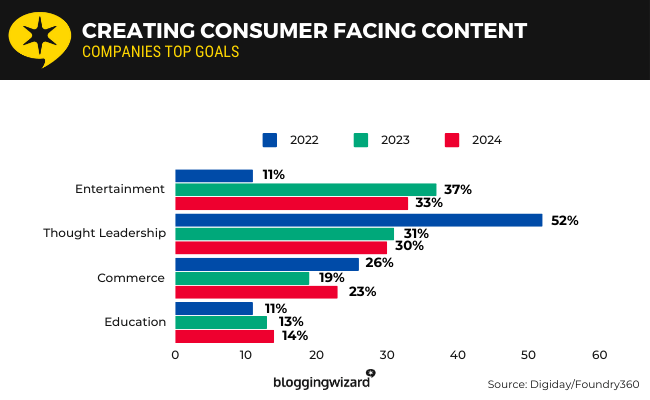
30% will use consumer-facing content in hopes of creating a more authoritative voice.
23% will use this type of content for commercial purposes while 14% intend to create more educational content.
Source: Digiday/Foundry360
6. 73.28% of content marketers experience a moderate amount of stress on a day-to-day basis
According to Minuttia’s survey of content marketers, 68.32% experience a moderate amount of stress in their current roles on a day-to-day basis.
12.41% feel a high amount of stress while 14.31% experience a low amount of stress.
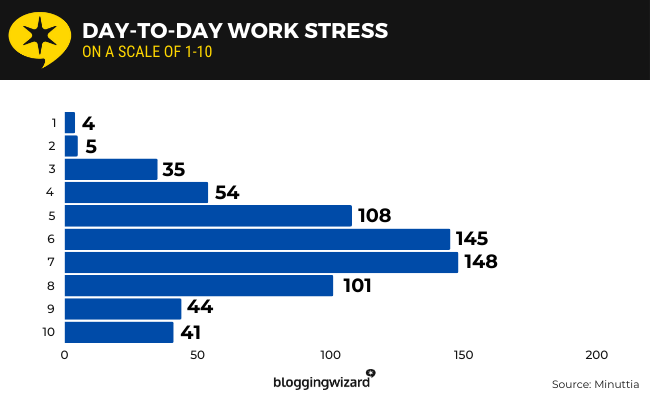
Source: Minuttia
7. 26.72% of content marketers look at other jobs monthly
Minuttia asked marketers in content marketing positions how often they look at other jobs.
The majority, or 26.72%, look at other jobs monthly.
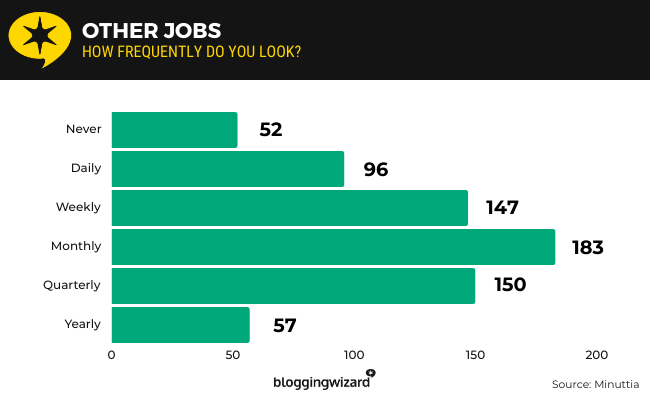
21.9% look quarterly while 21.46% look weekly.
14.01% look daily, and 7.59% never look at other jobs.
Source: Minuttia
8. 51.53% of content marketers are mostly concerned about driving results
Minuttia asked content marketers about concerns they have in their current roles.
The majority, or 51.53%, say driving results concerns them most.
45.26% say changes in Google search concerns them.
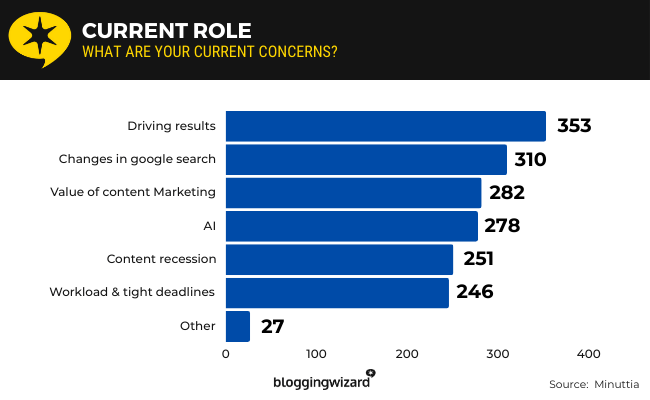
Here are other concerns content marketers have in regards to their roles:
- Communicating the value of content marketing – 41.17% of content marketers are concerned about this
- AI – 40.59%
- Content recession – 36.64%
- Workload and tight deadlines – 35.91%
- Other – 3.94%
Source: Minuttia
9. 45% of marketers struggle to attract high-quality leads with their content
Semrush asked marketers about the top challenges they face with content marketing.
The majority of marketers, or 45%, say they struggle to attract high-quality leads with their content.
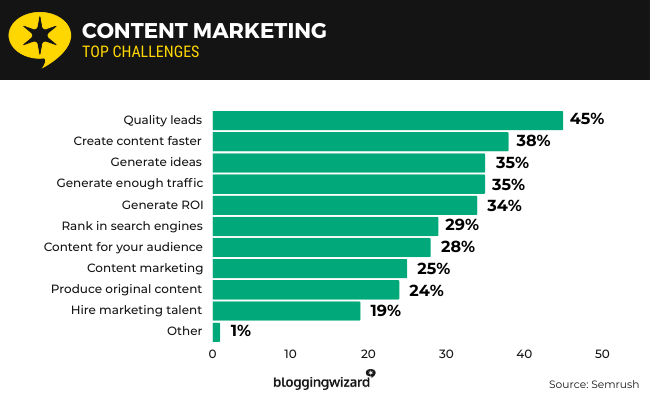
Here are other struggles voted for by marketers:
- Attracting quality leads with our content – 45% of marketers say this is a top challenge they face with content marketing
- Creating more content faster (and finding resources for it) – 38%
- Generating content ideas – 35%
- Generating enough traffic with our content – 35%
- Generating ROI and sales with our content – 34%
- Ranking in search engines – 29%
- Creating content that resonates with our audience – 28%
- Organizing content marketing processes in our company – 25%
- Producing original and high-quality content – 24%
- Hiring highly qualified content marketing talent – 19%
- Other – 1%
Source: Semrush1
10. 79% of very successful companies spend more than 10% of their marketing budgets on content
In Semrush’s State of Content Marketing report, they discovered that 77% of successful companies dedicate more than 10% of their total marketing budgets to their content marketing budgets.
This breaks down into 79% of very successful companies and 75% of successful companies.
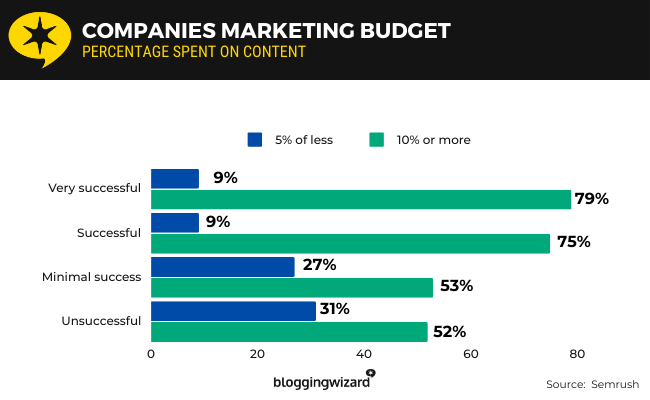
Only 52% of unsuccessful companies spend more than 10% of their marketing budgets on content while 53% of minimally successful companies do.
Furthermore, 31% of unsuccessful companies spend less than 5% of their total marketing budgets on content whereas only 9% of very successful companies do.
Later on in the report, Semrush asks marketers how much of their marketing budgets their companies spend on their content marketing budget.
According to the report, the majority of companies, or 36%, spend 10 to 29% of their marketing budgets on content.
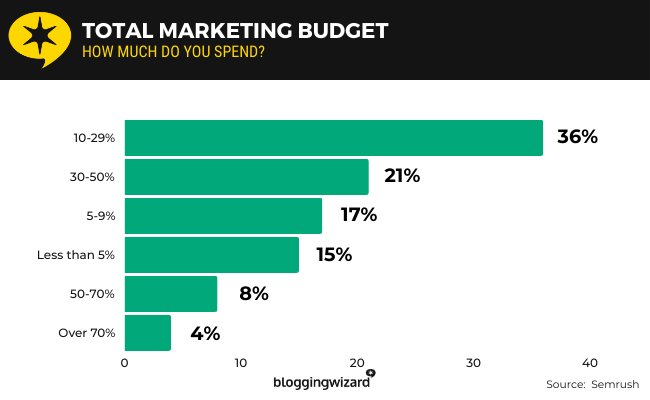
Here’s the full result from this part of the report:
- Less than 5% – 15% of marketers allocate this amount of their marketing budgets to content marketing
- 5 to 9% – 17%
- 10 to 29% – 36%
- 30 to 50% – 21%
- 50 to 70% – 8%
- Over 70% – 4%
Source: Semrush1
Content marketing strategy statistics
11. 80% of very successful companies have a content marketing strategy in place
In Semrush’s latest report on the state of content marketing, they discovered that a huge majority of very successful companies, or 80% of those surveyed, have a documented content marketing strategy.
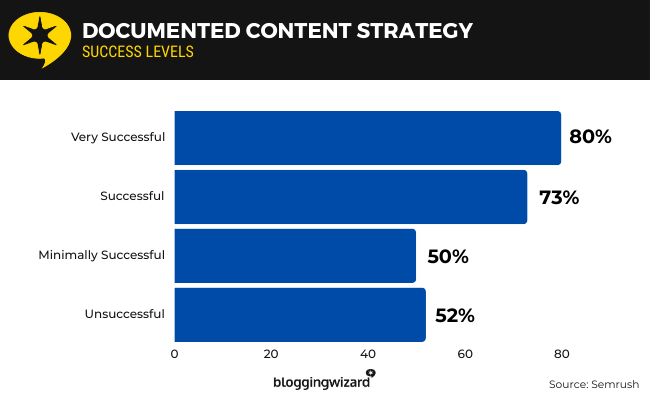
Only 52% of unsuccessful companies have a content strategy in place.
Source: Semrush1
12. 45% of marketers say video content performs the best
Semrush asked marketers about the different types of content they feel performs the best.
According to 45% of marketers, which was the majority, video content is far superior than any other type of content.
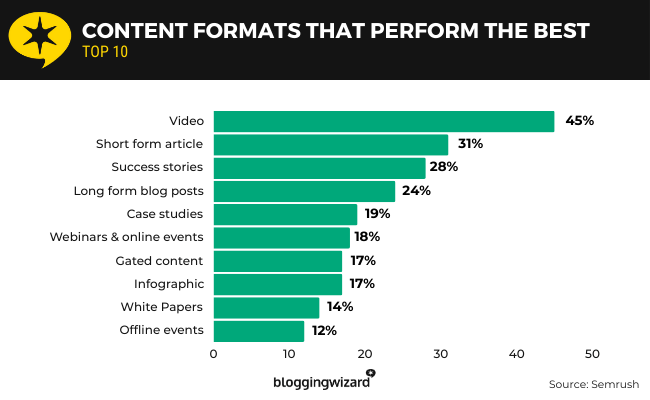
Other effective content formats include short-form articles (voted for by 31% of marketers), success stories (28%) and long-form blog posts (24%).
Source: Semrush1
13. 17% of marketers say the short-form video trend has the greatest return on investment
In HubSpot’s survey, the company asked marketers about the trends they use and which ones have the greatest ROI.
The majority of marketers, or 17%, say short-form videos have the greatest ROI.
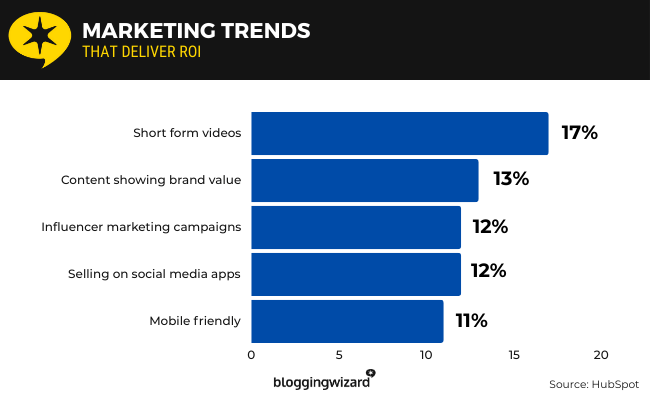
Plus, 30% of marketers who don’t produce short-form video content will start in 2024.
Source: HubSpot
14. 47% of marketers say consumer-facing content created as social media posts produce the best results
According to Digiday and Foundry360’s latest report on marketing, 47% of marketers say their companies experience the most success with consumer-facing content created as social media posts.
35% say videos while 31% say email newsletters and series.
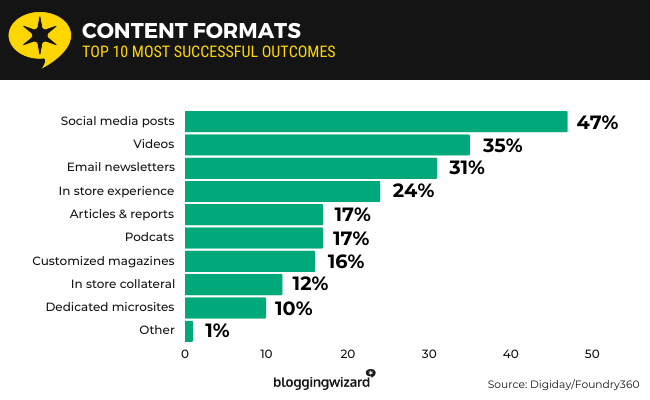
Source: Digiday/Foundry360
15. 32% of companies use organic search rankings to measure the success of consumer-facing content
According to Digiday and Foundry360’s report, 32% of companies use organic search rankings to measure the success of the consumer-facing content they produce.
28% use web traffic while 27% use retention rate.
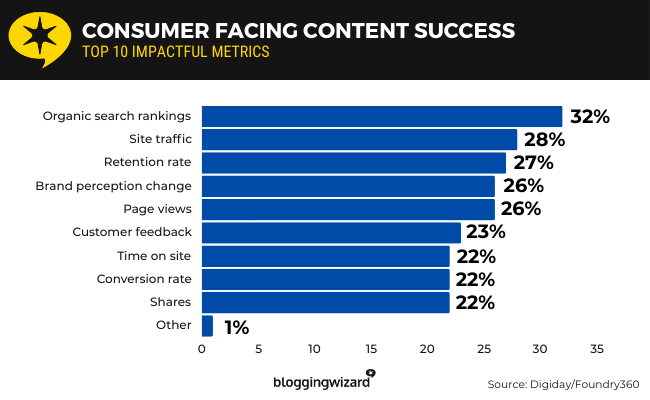
Source: Digiday/Foundry360
16. 70% of companies use paid channels to promote content
According to Semrush’s report, 72% of very successful companies and 68% of successful companies use paid channels for content distribution.
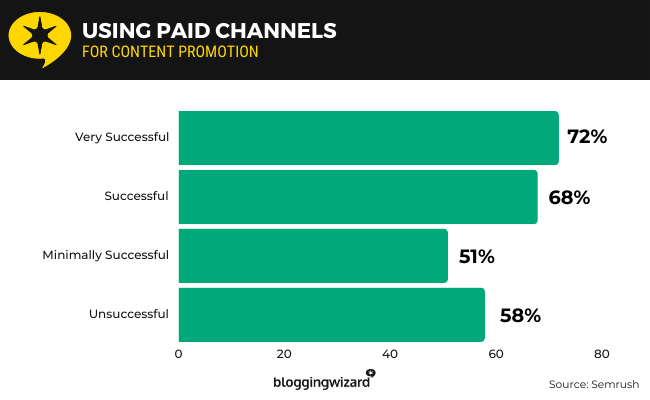
Even more surprising, however, is that this strategy is also popular among companies who are not as successful.
According to Semrush’s survey, 51% of minimally successful companies use paid channels to promote content as well as 58% of unsuccessful companies.
Source: Semrush1
17. 52% of successful companies use email marketing to promote content
Semrush’s survey states that 52% of successful companies use email marketing to promote content.
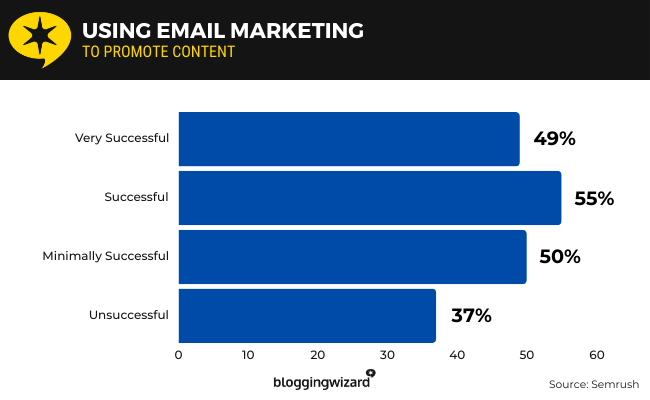
43.5% of companies who are “minimally successful” or unsuccessful use email marketing to promote content.
Source: Semrush1
18. 51% of successful companies use paid social media strategies to promote content
According to Semrush’s survey, 51% of successful companies use paid social media strategies to promote content.
This is in comparison to 39% of companies who aren’t as successful.
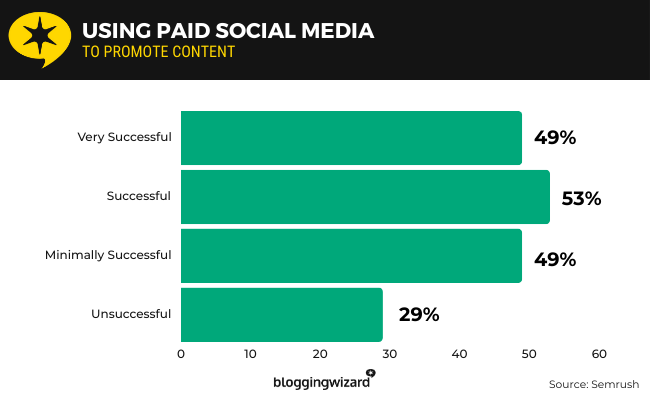
Unfortunately, Semrush’s report did not specify what those paid social media strategies were (sponsored posts, social media ads, etc.).
Source: Semrush1
19. 30.5% of successful companies use influencer marketing to promote content
According to Semrush’s survey, 30.5% of successful companies use influencer marketing to promote content.
This is in comparison to only 13% of companies who are not as successful.
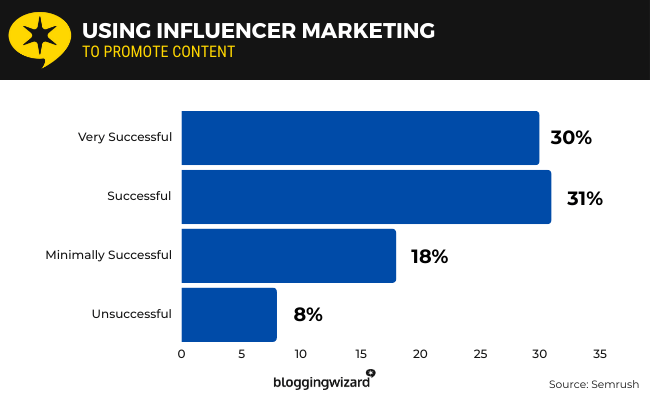
Source: Semrush1
20. 16% of marketers want to try influencer marketing for the very first time in 2024
Influencer marketing and experimental marketing are among new strategies marketers want to try in 2024.
16% of marketers want to try these strategies, the latter of which involves engaging customers in real life with events.
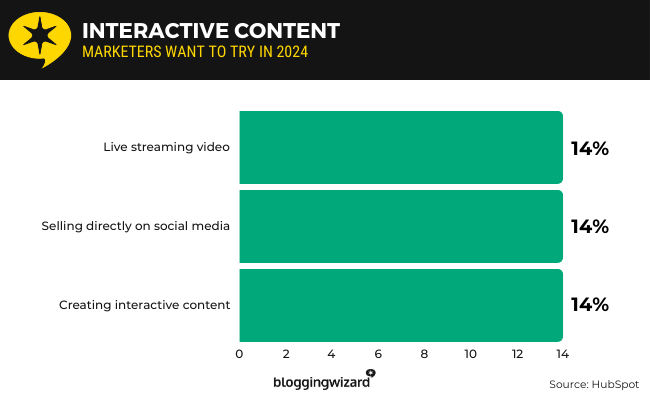
Source: HubSpot
21. 69% of successful companies measure return on investment on content
According to Semrush’s survey, 70% of very successful companies and 68% of successful companies measure their return on investment (ROI) on content.
This is in comparison to 46% of minimally successful companies and 56% of unsuccessful companies who measure ROI on content.
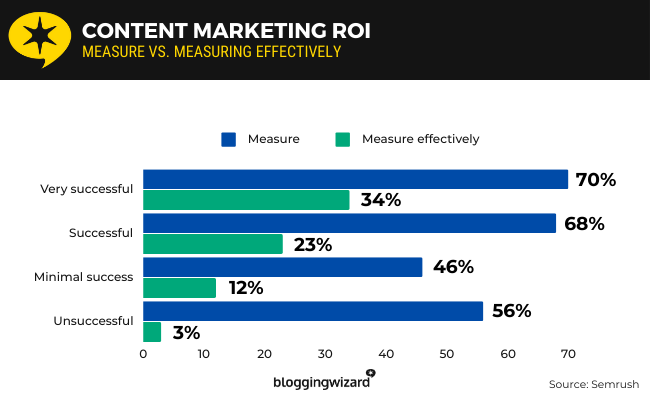
Furthermore, 28.5% of successful companies believe they measure ROI effectively versus only 7.5% of companies who are not as successful.
Source: Semrush1
22. 75% of successful companies measure the overall performance of their content
According to Semrush’s survey, 77% of very successful companies and 73% of successful companies measure the overall performance of their content.
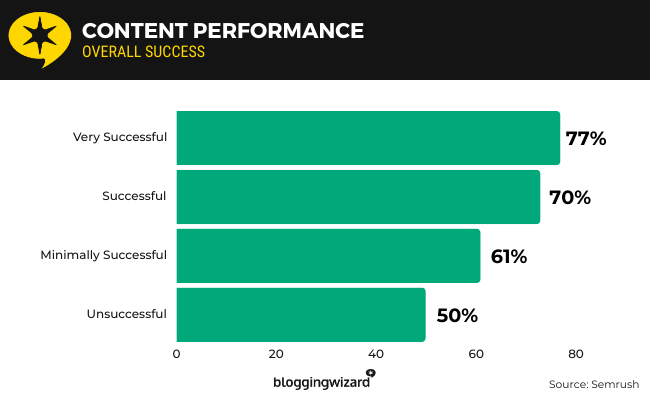
This is in comparison to 55.5% of minimally successful and unsuccessful companies.
Source: Semrush1
23. 60% of successful companies conduct two or more content audits per year
Semrush’s report states that 61% of very successful companies and 59% of successful companies conduct two or more content audits every year.
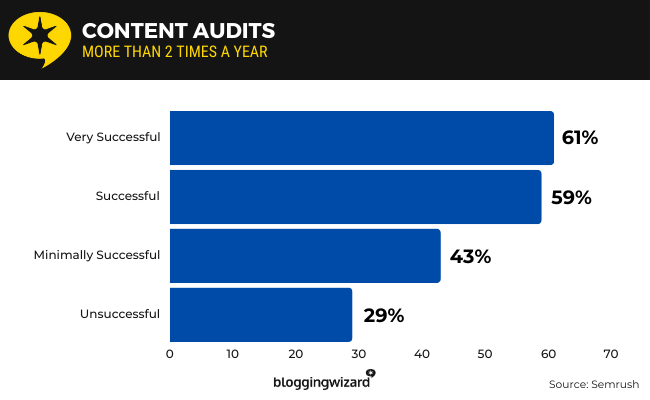
43% of minimally successful and 29% of unsuccessful companies conduct as many content audits as well.
Source: Semrush1
24. 47% of marketers say researching the company’s audience is the most important factor that leads to success in content marketing
Semrush asked marketers about factors they believe lead to success in content marketing.
“Researching our audience” received the most votes with 47% of marketers saying it leads to success.
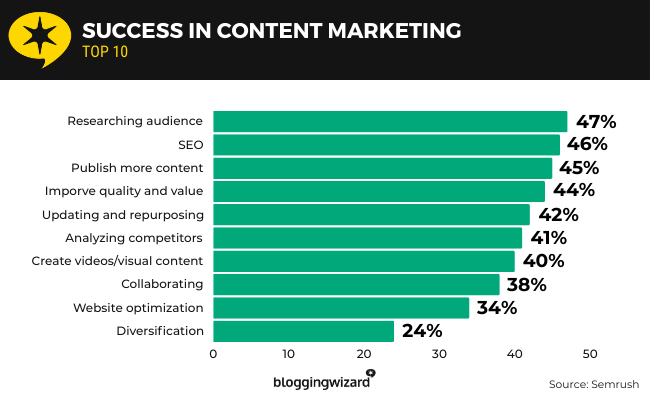
Source: Semrush1
25. Only 14% of companies use tools for content marketing
According to Semrush’s report, only 14% of companies use marketing automation platforms, visual content creation tools or editorial calendars.
To be more specific, only 16% of successful companies and 5.5% of not-so-successful companies use a marketing automation platform.
Only 22.5% of successful companies and 13% of not-so-successful companies use visual content creation tools.
Finally, only 16% of successful companies and 11% of not-so-successful companies use an editorial calendar.
Source: Semrush1
26. 47% of marketers say their companies are working toward using cookie-free targeting
The majority of marketers, or 47%, are developing plans to use cookie-free targeting in the wake of the General Data Protection Regulation and privacy concerns among internet users.
41% will continue using third-party cookies to target their audience while 12% aren’t sure.
Source: HubSpot
Blogging & SEO statistics
27. 86% of marketers use blog posts as part of their marketing strategies
According to a survey conducted by Semrush, the majority of marketers, or 86%, use blog posts in their marketing strategies.
This makes blog posts the most popular type of content among marketers.
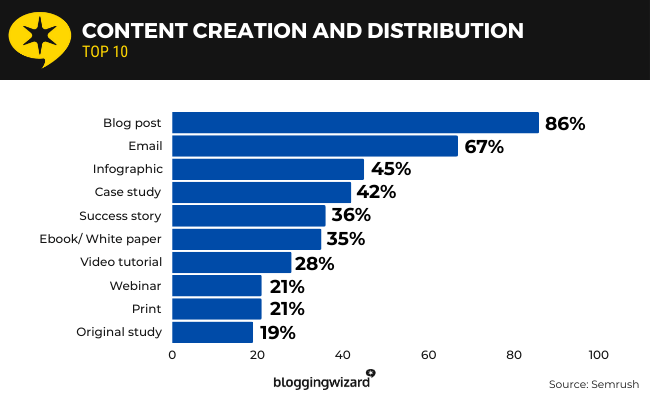
So, blogging is still extremely popular, and there are plenty of other statistics to support this.
Other popular content formats include email (67% of marketers use this content type), infographic (45%) and case study (42%).
Source: Startup Bonsai1
28. 55% of marketers say creating more content and posting more often is the most effective SEO tactic
Semrush asked marketers about the tactics they believe are most effective at boosting a site’s rankings.
According to 55% of marketers, creating more content and posting more often is the most effective way to boost rankings.
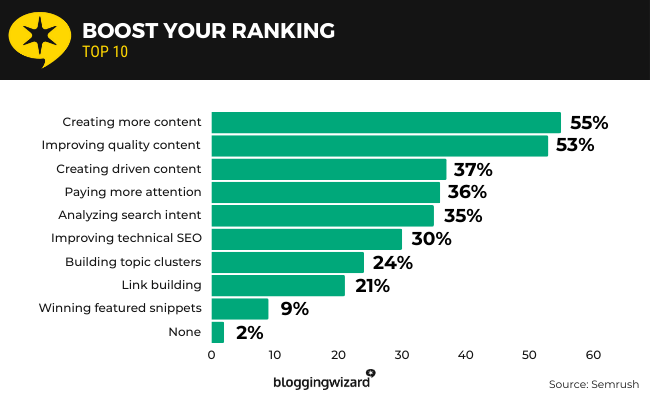
Source: Semrush1
29. 24% of high-performing websites publish one article per day
In Semrush’s latest report on content marketing, they analyzed websites with varying degrees of performance.
They discovered that 24% of high-performing websites publish one article per day on average while 27% of low-performing websites publish one article every few weeks.
62% of average-performing websites publish several articles per day.
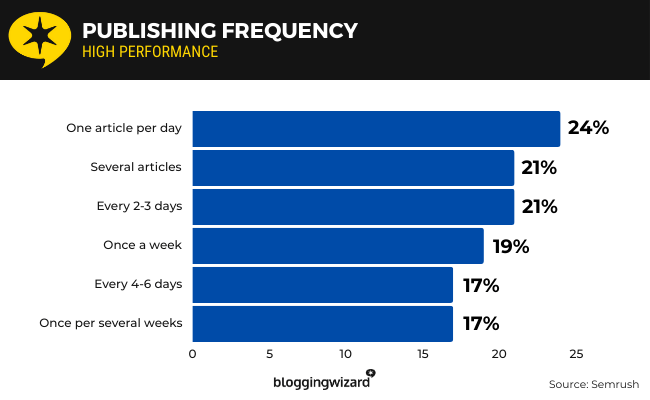
Source: Semrush1
30. 71% of consumers view blog posts in their buying journeys
According to a survey about content preferences, 71% of consumers said they view blog posts in their buying journeys.
79% read case studies, 76% read infographics, 66% attend webinars, 64% listen to podcasts and 49% watch videos.
Source: Startup Bonsai2
31. “Everything you need to know” type of articles receive an average of 665 unique pageviews per month
Semrush analyzed 500,000 English-based articles that had an average of 30,000 and 500,000 organic monthly views in a year.
20% were high performing, 20% were low performing and 60% were average performing.
They discovered that “everything you need to know” type of articles performed the best as they had an average of 665 unique monthly pageviews.
Comparison articles performed well, too. They had an average of 660 unique monthly pageviews.
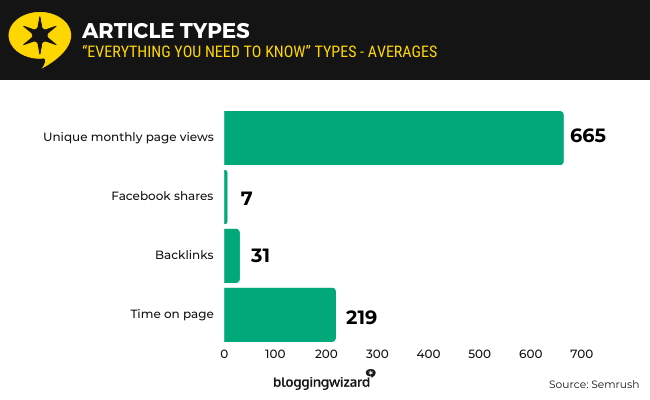
Source: Semrush1
32. 31% of articles use only H2 headings
According to Semrush’s analysis of 500,000 articles, the majority, or 31%, use only H2 headings.
25% use H2 and H3 headings while 24% don’t use H2 headings at all.
16% use the wrong structure while only 4% use H2, H3 and H4 headings.
In terms of what headings are popular based on performance, 35% of low-performing articles do not use H2 headings, 60% of average-performing articles use only H2 headings, and 29% of high-performing articles use H2, H3 and H4 headings.
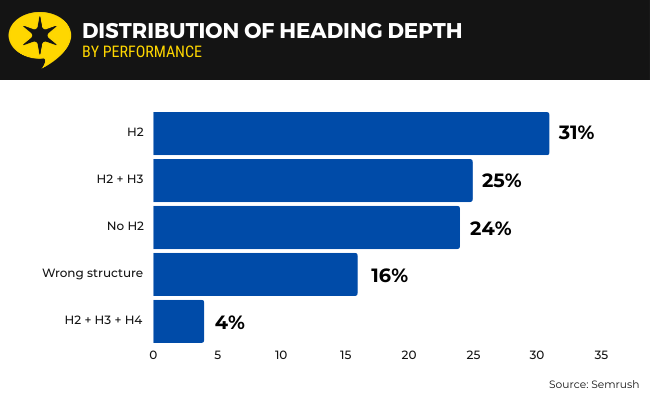
Source: Semrush1
33. Articles that feature four or more lists every 500 words receive an average of 564 unique pageviews per month
According to Semrush’s analysis of 500,000 articles that received an average of 30,000 to 500,000 organic monthly views in a year, the majority, or 68%, do not use lists at all.
However, they discovered a direct correlation between the number of lists articles use and the number of unique pageviews, shares and backlinks they receive.
On average, articles they analyzed that used four or more lists every 500 words received higher amounts of each of these metrics.
They received an average of 564 unique pageviews, 16 shares and 96 backlinks.
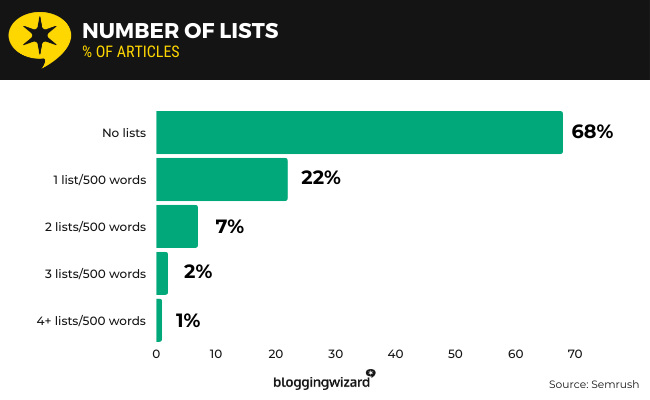
Source: Semrush1
34. Articles that use more than seven images receive an average of 359 unique pageviews per month
According to Semrush’s analysis of 500,000 articles, there’s a direct correlation between the number of images articles use and the number of unique pageviews, shares and backlinks they receive.
The higher the number of images an article uses, the more of each of these metrics it receives.
And yet, 51% of the articles they analyzed only use one image.
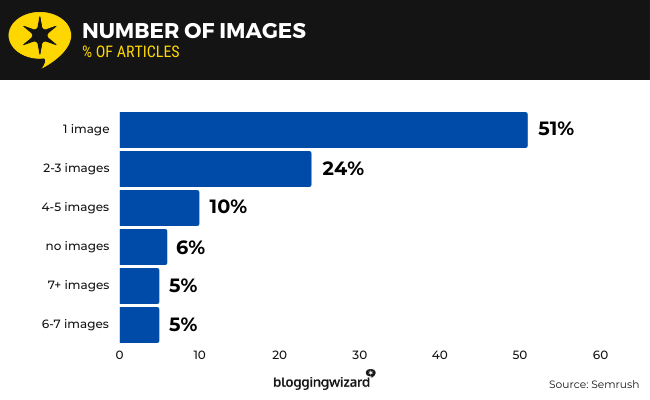
Source: Semrush1
Social media marketing statistics
35. 57% of marketers are using Facebook
According to HubSpot’s marketing report, the majority of marketers use Facebook.
57% of marketers are using this platform while 55% use Instagram and 52% use YouTube.
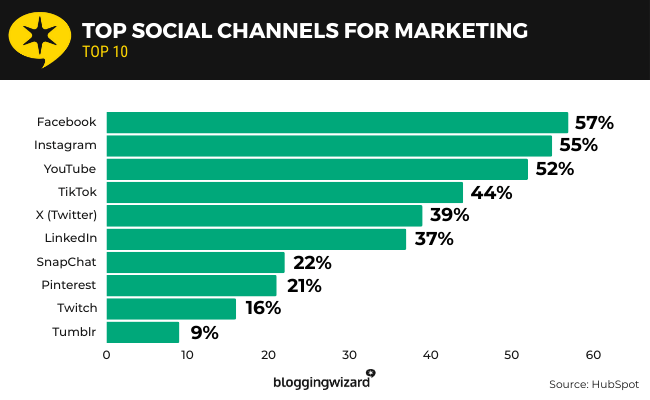
Source: HubSpot
36. 29% of marketers say Facebook and Instagram have the greatest return on investment
Out of all social media platforms, marketers say Facebook and Instagram have the greatest ROI.
29% of marketers say Facebook has the greatest ROI while another 29% say Instagram does.
26% say YouTube has the greatest ROI while 24% say TikTok does.
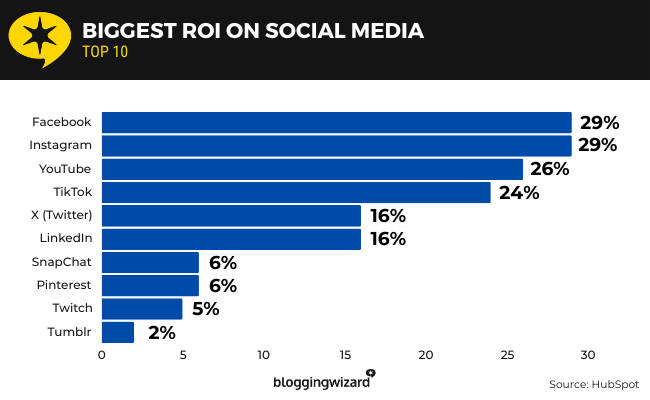
Source: HubSpot
37. 56% of marketers will invest more in TikTok in 2024
According to HubSpot’s data, marketers will invest more in producing TikTok content than any other social media platform out there.
Source: HubSpot
AI-related content marketing statistics
38. 67% of marketers are using AI tools for content marketing
According to Semrush’s latest report on AI in content marketing, the majority of marketers, or 67%, are using AI tools, such as generative AI tools, for content marketing in some kind of way.
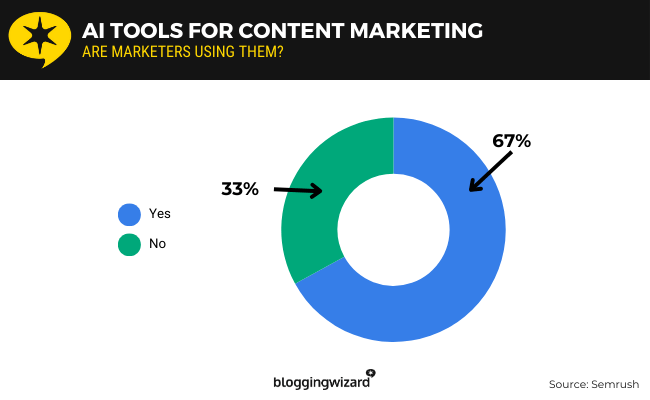
Of the 33% who voted “no,” 35% were not aware that AI can be used to assist in content marketing and SEO.
Plus, 57% of those who voted “no” are open to reconsidering using AI in the future.
If you’d like to learn more, be sure to check out our post on generative AI statistics.
Source: Semrush2
39. 30.5% of marketers who don’t use AI for content marketing are worried about originality and quality
Of the marketers in Semrush’s report who don’t use AI for content marketing and are aware of it, 31% are worried about the originality and quality of the content AI tools produce.
37% simply lack training and understanding of how AI tools work.
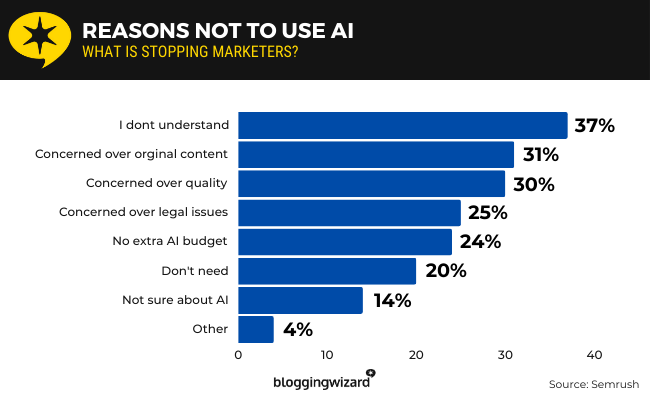
Here are other concerns marketers have about using AI as a marketing tool:
- Potential legal issues related to AI-generated content – 25% of marketers voted for this option
- Lack of budget for AI tools – 24%
- Don’t need AI tools – 20%
- Unsure if AI-generated content can rank in search engines – 14%
- Other – 4%
Unfortunately, Semrush didn’t provide responses from “Other” votes.
Source: Semrush2
40. 71% of marketers who use AI for content marketing rate their overall performance as effective
According to Semrush’s survey, 46% of marketers who use AI for content marketing rank their overall content marketing performance as “effective.”
26% rank it as “very effective.”
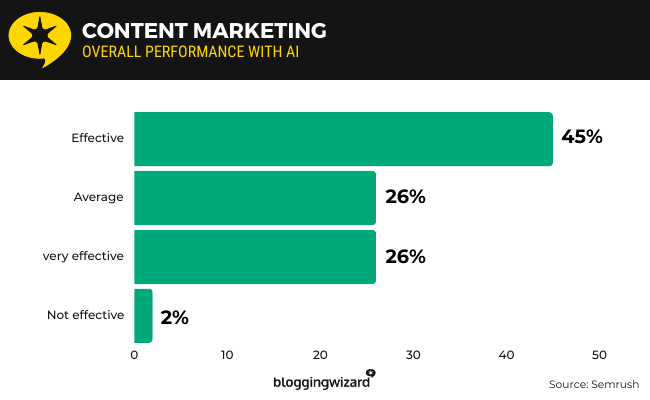
Another 26% rank their overall content marketing performance as “average” while only 2% say their performance is “not effective.”
Source: Semrush2
41. 58% of content marketers who use AI use the technology to research content and topic ideas
According to Semrush’s report, the majority of content marketers who use AI for content marketing use it to research content and topic ideas.
52% use it to rewrite and paraphrase text while 50% use it to write content from scratch.
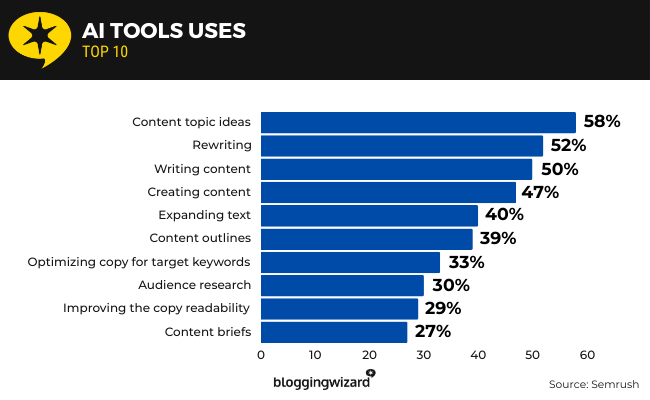
Source: Semrush2
42. 58% of marketers who use AI to create content use it to create blog posts
According to Semrush, when it comes to the type of content marketers use AI to create, the majority use the technology to create blog posts.
55% use it to create social media posts, 49% use it to create short articles and 31% use it to create short videos.
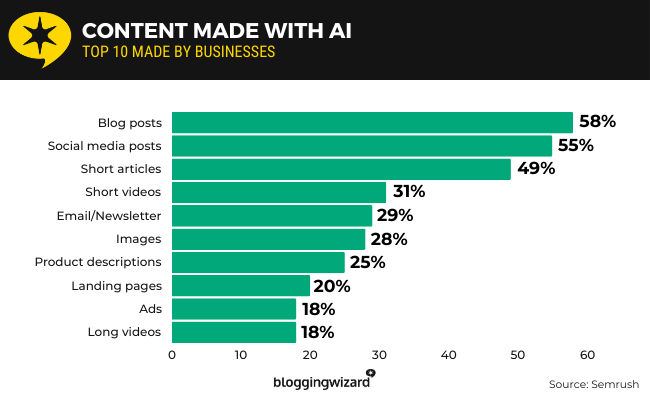
Source: Semrush2
43. 85% of marketers who use AI say the technology has improved content quality
HubSpot asked marketers who use AI for content creation about the benefits they’ve experienced while using it.
The majority say that AI has helped them improve the quality of their content.
84% say that AI tools have improved efficiency, 82% say AI increased their capabilities for content creation and 77% say AI helped them create more personalized content.
Source: HubSpot
44. 49% of content marketers who use AI use multi-step prompts
Semrush asked content marketers who use AI about the types of prompts they input into AI tools.
The majority of these marketers, or 49%, voted for the option that states, “I tend to do multi-step prompts and ask many additional questions when talking to AI (for example, sharing content pieces I wrote myself so that it understands my tone of voice.”
42% said they use short prompts that only require one or two steps while 41% use different prompting techniques, such as asking AI to act like a content writer.
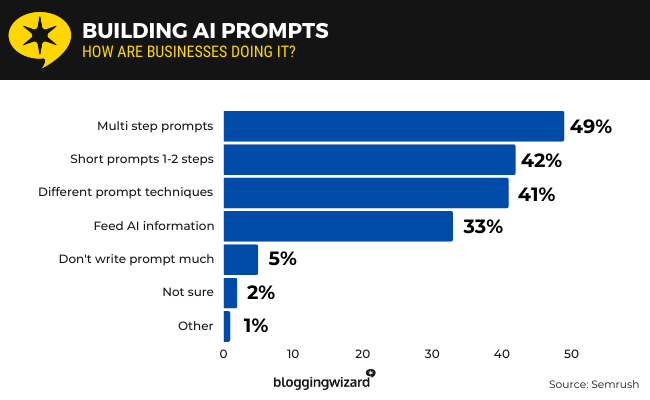
Source: Semrush2
45. 73% of marketers who use AI for content marketing check the quality of AI-generated content themselves
Semrush asked content marketers who use AI how they check the quality of AI-generated content.
The vast majority review the content themselves to check for tone of voice and writing style.
48% fact check AI-generated content themselves.
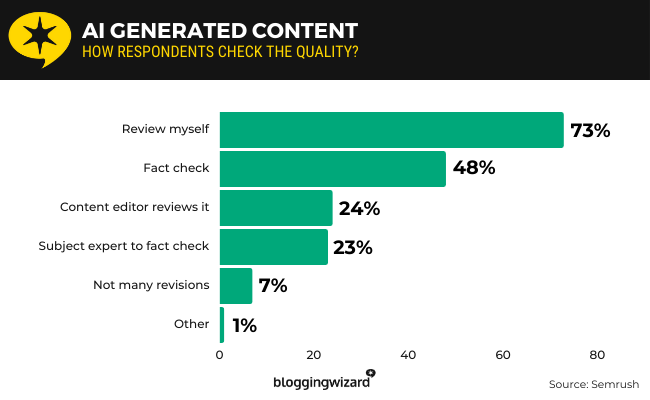
Source: Semrush2
46. 42% of content marketers who use AI are worried about originality
Semrush asked marketers who use the technology for content marketing about the challenges they face when using AI.
42% are worried about the originality of AI-generated content.
36% say it’s difficult to integrate their unique tone of voice in content when using AI while 31% say there’s no real-life data on target keywords.
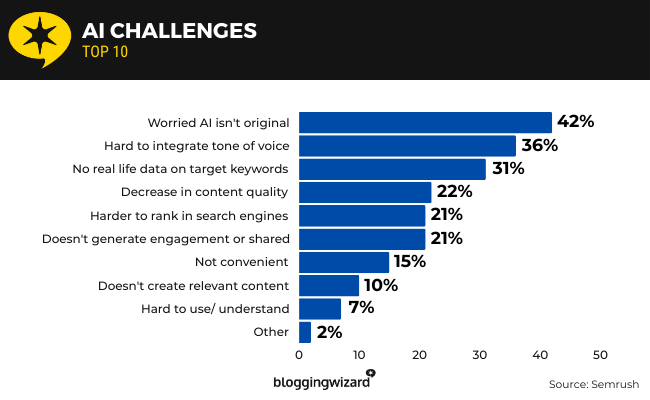
Source: Semrush2
Sources
- Allied Market Research
- Minuttia
- HubSpot
- Digiday/Foundry360
- Semrush1
- Startup Bonsai1
- Startup Bonsai2
- Semrush2
Final thoughts
That concludes our list of content marketing statistics.
We learned that short-form video content, such as those you can create with TikTok, Facebook Reels, Instagram Reels and YouTube Shorts, have the greatest return on investment and that video marketing itself performs the best.
Yet, blog posts are still an integral part of a successful content marketing strategy as it remains to be the best way to drive organic search traffic to a website.
Finally, we learned that AI use is on the rise, a trend that will continue in 2024.
If you need help improving your content marketing efforts and developing your own content strategy, be sure to view our tips on creating one.
